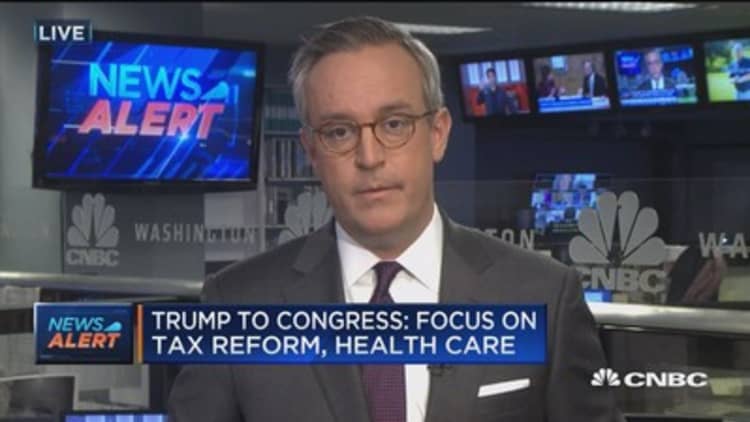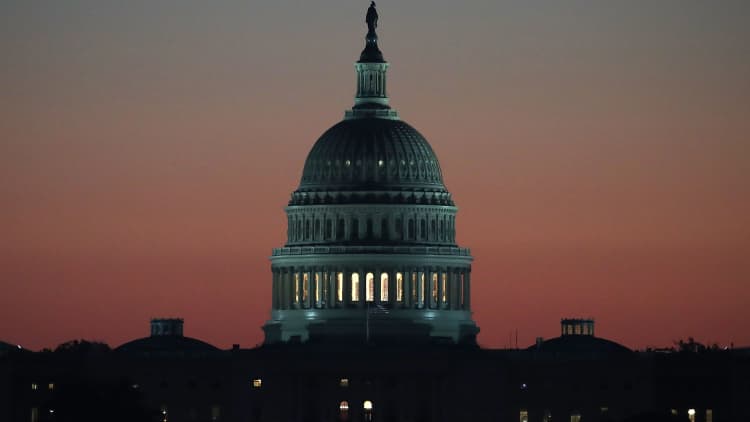
The 115th Congress got off to a very strange and troubling start this week with a surprise — and quickly scrapped — Republican move to gut the Office of Congressional Ethics (OCE), the watchdog agency set up in 2008 after a series of scandals on Capitol Hill.
The move also quickly set up a schism between congressional Republicans and President-elect Donald Trump as well as an apparent breakdown in communication between Trump and one of his own top advisors.
The bizarre series of events began Monday evening when House Republicans with no notice or debate approved a series of rules changes that would have ended the independent power of the OCE and place it under the authority of the House Ethics Committee.
Under the new rules, the OCE would have not been allowed to take anonymous tips, investigate criminal activity or share its findings with other branches of the government or the public. Taken together, the changes would have essentially eliminated the office's ability to conduct independent oversight of potential wrongdoing by members of Congress. House Republicans backed away from that plan on Tuesday.
Still, it's a very strange message to send after a campaign in which the party's presidential candidate pledged to "drain the swamp" and clean up influence peddling in Washington.
On ABC's "Good Morning America" on Tuesday morning, top Trump aide Kellyanne Conway defended the move. "Let's make clear that you're still going to have an Office of Complaint Review. In other words, it's not like we're taking away everything," she said. "Look, there's a very ambitious agenda to push forward. The Republicans have been given the majority in the House and the Senate, most of the governorships, they've won over 1,000 state legislative seats under President Barack Obama's watch. So there's a mandate there for them to make significant change."
But Trump on Tuesday took a different position, criticizing the move, on Twitter. "With all that Congress has to work on, do they really have to make the weakening of the Independent Ethics Watchdog, as unfair as it may be, their number one act and priority. Focus on tax reform, healthcare and so many other things of far greater importance! #DTS"
Trump hedged his statement with the reference to the OCE being "unfair" but the overall message was a clear rebuke to House Republicans, led by Rep. Bob Goodlatte, R-Va. House Speaker Paul Ryan and Majority Leader Kevin McCarthy also reportedly opposed the timing of the OCE move, preferring to wait until bipartisan changes could be made in the office.

The nuances of a relatively obscure congressional oversight office may well be lost on the American public. But the GOP just handed Democrats a potentially powerful talking point to kick off a Congress that will see Republicans attempt to repeal the Affordable Care Act, pass massive tax cuts, reduce a large swath of regulations and make other sweeping moves that Democrats will attempt to oppose.
Democrats can now argue both in the immediate term and later on ahead of the 2018 midterms that the first act of the Republican-led 115th Congress was to destroy an office intended to prevent and expose bribery and other corruption on Capitol Hill. And an opening day that was meant to display GOP unity as the party prepares for full control of Washington for the first time since the beginning of George W. Bush's presidency was instead left in disarray. Some Republicans suggested that Trump's tweets could force the House GOP to ditch its proposed changes to the OCE.
But the larger question is how often Trump and Republicans on Capitol Hill will be at odds. There is broad agreement on the contours of a tax reform plan that would lower both corporate and individual rates but less consensus on whether and how much the resulting lost revenue must be offset by big spending cuts.
Trump also wants a big infrastructure spending plan but could face opposition from some Republicans on the nature and price tag of such an effort. Plenty of Republicans on Capitol Hill also oppose Trump's plans for punitive taxes on imported goods and his overall approach to free trade including plans to gut NAFTA and other existing trade deals.
Hill Republicans led by Sens. John McCain and Lindsey Graham are also skeptical of Trump's support for Russia and its president, Vladimir Putin, and want robust investigations into allegations of Russian hacking of the 2016 election. This dispute over Russia could spill into confirmation hearings for Trump's selection of Exxon Mobil CEO Rex Tillerson for secretary of State. Tillerson has longstanding ties to Putin's Russia.
Ordinarily an incoming president would have a very strong hand to set the congressional agenda and bend the party to his will. But Trump comes into office having lost the popular vote by 3 million and with a dismal approval rating of around 43 percent, the lowest for an incoming president in the modern era. A new survey by Gallup also shows historically low confidence in Trump on a series of critical measures.
Trump could enjoy another bounce in popularity after his inauguration later this month and strengthen his hand in dealing with Congress. But if his numbers sag further, Hill Republicans could decide that it is their agenda and not the president's that should take precedence. And if the first day of the new Congress is any indication, we could be in for a messy series of fights between Capitol Hill and the White House that could erase the current euphoria in markets about the dawn of a new unified Republican era in Washington.
Updated: This column was updated to reflect the news that House Republicans were scrapping plans gut the ethics office.
Correction: House Republicans backed away from the Office of Congressional Ethics plan on Tuesday. An earlier version misstated the day.
—Ben White is Politico's chief economic correspondent and a CNBC contributor. He also authors the daily tip sheet Politico Morning Money [politico.com/morningmoney]. Follow him on Twitter @morningmoneyben.


